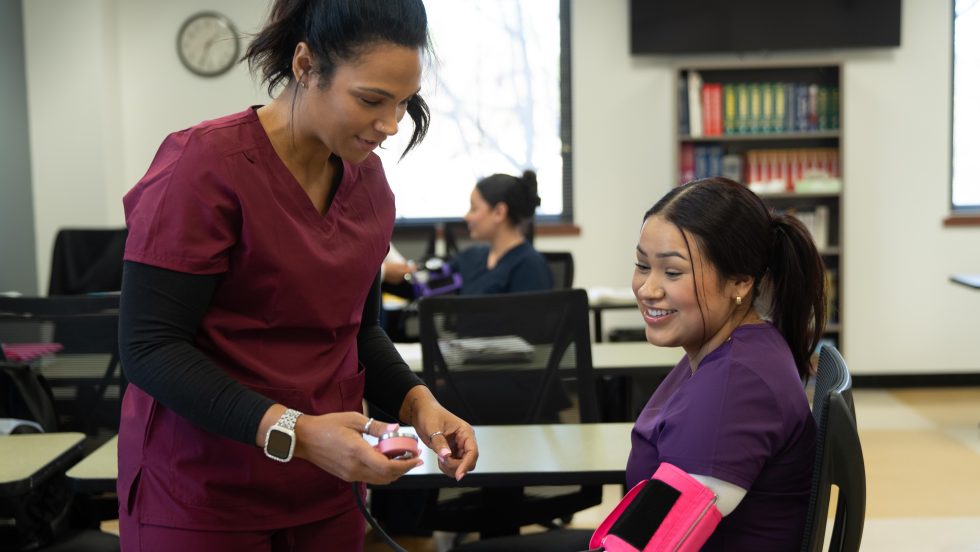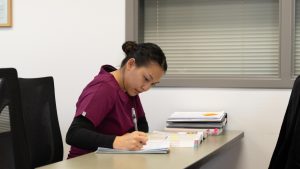She had come to visit the professors who, 20 years earlier, helped her learn the clinical and office management skills that turned her into a qualified medical assistant.
The woman had studied with Program Coordinator Patti Eighmey and Clinical Skills Adjunct Professor Andrea Lawrence in Merced College’s medical assistant program, then secured a job with the same doctor with whom she had worked during her externship.
She worked with that pediatrician for 20 years before returning to tell her tale. The former field worker also brought along her college-aged son.
“She told us, ‘I wanted to take a photo with you and Andrea and tell you that my son is going to UC Merced,’” Eighmey said “It was amazing. It just felt like her time with us had made a big difference, and not just for her. In one generation, it changed the life of her entire family.”
That woman’s experience at Merced College was transformative.
It was also free.
“One of the bigger challenges our adult ed students face is overcoming barriers,” Eighmey said. “Some are single parents. Some want new skills after a life change. Some need more training for what they already do. What is right about adult education and the BRC’S protective environment is that we can meet any student where they’re at and help them realize their goals.”
The same programs could cost thousands of dollars elsewhere. Adult education and noncredit training are powerful tools the college can wield to empower its community.
“These programs are built for students wanting to go to work as quickly as they can,” Dean of Business, Adult Education and Noncredit Caroline Dawson said. “And they’re quick paths to high-demand careers.”
Merced College offers free pathways for office occupations, English as a Second Language, GED prep, truck driving and medical assisting.
All medical assistant and office occupations students start with adjunct professor Chris Carroll learning basic computer skills and front office work.
Students who choose the medical assistant pathway then train with Eighmey in back-office skills like medical terminology, administrative office procedures, Medisoft, and maintaining Electronic Health Records (EHR). All of that prepares them to take the Internet & Computing Certification (IC3) test.
Medical assistant students then train on the clinical side with Lawrence, learning how to take vital signs, administer medications, give injections, do EKGs and perform lab procedures. They must then pass a one-day seminar to become nationally certified on working with and avoiding exposure to blood-borne pathogens.
They can attend the full-time classroom program over 10 months at the BRC, whose staff also includes adjunct faculty Jan Vitato and Kim Mattos. Or they can do their training at the part-time evening offering over 22 months at the Los Banos Campus with adjunct professors Ana Sanchez Urzua, Marielle Valdez, Raj Mehat and Christian Chacon.
The trainees finish by working with patients in a supervised local externship for 180 hours.
Medical assistant students earn a certificate of competency at the end of the program. They’re also eligible to take the California Certified Medical Assistant Exam (CCMA). All students are encouraged to earn the state credential. The instructors said students who do that, and also push to complete additional certifications, are most likely to succeed.
That extra effort gives graduates a leg up while finding work. Working with an experienced faculty gives them another boost. Lawrence has taught these courses for 29 years; Eighmey for 31. Carroll started with the administrative office management program on the main campus 10 years ago and has been at the BRC for the past five.
“Our strength is having the same team over so many years,” Carroll said. “We have a passion for it, and that carries over to our students. … But we’re also great at talking to employers and finding out what they need and tweaking our program so we push out the most qualified applicants.”
For example, employers kept asking to see office personnel with experience in Quickbooks, cloud storage and document sharing. Now students get that training. (Quickbooks is optional.)
Carroll guides medical assistant students and office office occupations in their initial computer applications training.
Office occupations students then earn their own certificate, taking additional classes on advanced administrative tasks, as well as teamwork, work culture, organizational structures and professional ethics. They leave with skills to operate the Microsoft Office Suite, as well as keyboarding and document formatting. Office occupations graduates then have the flexibility to work remotely or in an office.
The instructors spin magic backed by a motivated administrative team with Dawson, Area Administrative Coordinator Denise Dupree, Program Assistant Karla Narvaez-Flores and Office Technician Sal Lomeli.
“Our adult and noncredit ed team is like its own college,” Dawson said. “Sal is almost our enrollment person. Carla does outreach like a counselor would. Denise helps me to develop schedules and run the business side.”
The synergy between motivated students and passionate staffers creates success stories like the one above.
“My favorite part is working with students from start to finish,” Carroll said. “You don’t always get that on the traditional academic route. But we’re with them from 8 a.m. to 4 p.m. every day. It’s so fulfilling to get to know students and see their progress.”

